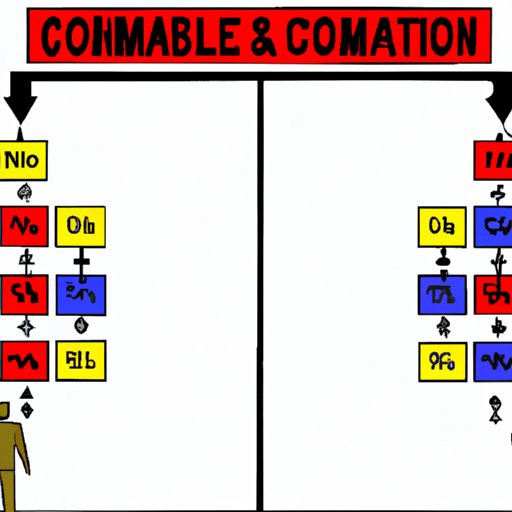Introduction
Commerce and business are two terms that are often used interchangeably, but they actually have distinct meanings. Commerce refers to activities that involve the exchange of goods and services, while business refers to activities related to the production and sale of goods and services. This article will explore the core differences between commerce and business and provide a comprehensive guide to understanding their distinctions.
A Comparison of Commerce and Business: What are the Key Differences?
It is important to understand the fundamental differences between commerce and business in order to determine which one is right for you. To begin, let’s look at an overview of each.
Overview of Commerce
Commerce is defined as the “exchange of goods or services for money or other goods or services” by the Oxford English Dictionary. It involves buying and selling products and services, such as retail stores, online stores, and wholesalers. It is a broad term that encompasses all aspects of the buying and selling process, from finding customers and suppliers to negotiating prices and terms of sale.
Overview of Business
Business is defined as “the activity of making, buying, or selling goods or providing services in exchange for money” by the Oxford English Dictionary. It involves the production and distribution of goods and services, such as manufacturing, marketing, advertising, and consulting. Businesses can be large or small and can take many forms, such as corporations, partnerships, and sole proprietorships.
Main Differences between Commerce and Business
The main difference between commerce and business is that commerce is focused on the exchange of goods and services, while business is focused on the production and sale of goods and services. Commerce is more concerned with the buying and selling process, while business is more concerned with the production and distribution of goods and services.

How Commerce and Business Differ: Exploring the Core Elements
Now that we have established the basic definitions of commerce and business, let’s delve deeper into the core elements of each.
Nature of Transactions in Commerce
Commerce is primarily concerned with the exchange of goods and services. This includes activities such as buying and selling products, bartering goods and services, and exchanging currencies. It is also concerned with the transfer of value, such as through transactions involving credit cards, checks, and money orders.
Nature of Transactions in Business
Business is primarily concerned with the production and sale of goods and services. This includes activities such as manufacturing, marketing, advertising, and consulting. It is also concerned with the process of creating and distributing products and services, such as developing new products, finding customers, and setting prices.
Types of Goods and Services in Commerce
Commerce involves the exchange of a variety of goods and services, including tangible products such as clothing, electronics, and food, as well as intangible services such as banking and insurance. Commerce also includes activities such as trading stocks and bonds, investing in real estate, and participating in foreign currency markets.
Types of Goods and Services in Business
Business involves the production and sale of a variety of goods and services. This includes tangible products such as furniture, appliances, and automobiles, as well as intangible services such as web design and software development. Business also includes activities such as research and development, product testing, and customer service.

Understanding the Contrast Between Commerce and Business
Now that we have explored the core elements of commerce and business, let’s take a closer look at the basic principles of each.
Basic Principles of Commerce
The basic principles of commerce involve the exchange of goods and services for money or other goods and services. This includes activities such as buying and selling, bartering, and investing. It is based on the concept of supply and demand, where buyers and sellers negotiate prices and terms of sale.
Basic Principles of Business
The basic principles of business involve the production and sale of goods and services. This includes activities such as manufacturing, marketing, and consulting. It is based on the concept of profitability, where businesses strive to maximize profits by producing and selling quality products and services.
Impact of Market Forces on Commerce
Market forces can have a significant impact on commerce. Factors such as supply and demand, competition, and economic conditions can affect the prices and availability of goods and services. Businesses must be aware of these factors and adjust their operations accordingly.
Impact of Market Forces on Business
Market forces can also have a significant impact on business. Factors such as customer demand, market trends, and technological advancements can affect the success of a business. Companies must be aware of these factors and adjust their strategies accordingly.

Setting Up Shop: The Distinctions Between Commerce and Business
In addition to the basic principles of commerce and business, there are also differences in the structure and regulations governing each. Let’s take a look at the key differences.
Structure of Commerce
The structure of commerce can vary depending on the type of business. For example, retail stores typically have a single owner or a small group of owners, while wholesalers may have multiple owners or shareholders. Additionally, some businesses may operate as a franchise or as part of a larger company.
Structure of Business
The structure of business is typically more complex than that of commerce. Businesses can be structured as sole proprietorships, partnerships, corporations, or limited liability companies (LLCs). Each type of business has different regulations and requirements for setting up and running the business.
Regulations and Laws for Commerce
Commerce is subject to various laws and regulations, such as those governing taxes, contracts, and consumer protection. Businesses must be aware of these laws and regulations and comply with them in order to avoid penalties and legal action.
Regulations and Laws for Business
Businesses are subject to a variety of laws and regulations, such as those governing employment, safety, and environmental protection. Companies must be aware of these laws and regulations and comply with them in order to operate legally and protect the interests of their employees, customers, and stakeholders.
Business or Commerce? Unveiling the Variations
Now that we have examined the differences between commerce and business, let’s take a closer look at the advantages and disadvantages of each.
Advantages of Doing Business
The main advantage of doing business is the potential to generate profits. Businesses can benefit from economies of scale, which allow them to produce and distribute products and services at a lower cost. Additionally, businesses can benefit from brand recognition, which can help attract customers and increase sales.
Advantages of Doing Commerce
The main advantage of doing commerce is the potential to make a profit. Commerce can benefit from economies of scope, which allow businesses to buy and sell products and services at a lower cost. Additionally, commerce can benefit from being able to quickly respond to changes in the market, such as fluctuations in prices and customer demand.
Disadvantages of Doing Business
The main disadvantage of doing business is the risk of financial loss. Businesses can suffer losses due to factors such as competition, market fluctuations, and changing consumer preferences. Additionally, businesses can be subject to government regulations and taxes, which can reduce profits.
Disadvantages of Doing Commerce
The main disadvantage of doing commerce is the risk of fraud. Commerce involves dealing with customers and suppliers, who may not always be honest or trustworthy. Additionally, commerce can be subject to fluctuating market prices, which can reduce profits.
The Ins and Outs of Commerce vs. Business: A Comprehensive Guide
Now that we have explored the advantages and disadvantages of commerce and business, let’s take a look at the strategies for succeeding in either field.
Strategies for Succeeding in Business
There are several strategies for succeeding in business. These include researching the market, developing a strong brand, building relationships with customers and suppliers, and staying ahead of competitors. Additionally, businesses should focus on providing quality products and services and maintaining a positive reputation.
Strategies for Succeeding in Commerce
There are also several strategies for succeeding in commerce. These include researching the market, finding reliable suppliers and customers, negotiating prices, and staying abreast of industry trends. Additionally, companies should focus on providing quality products and services and maintaining a good relationship with their customers and suppliers.
Challenges Faced by Businesses
Businesses face several challenges, such as finding customers, managing costs, and competing with other businesses. Additionally, businesses must stay up to date with changing market dynamics and regulations and remain compliant with applicable laws.
Challenges Faced by Companies Engaged in Commerce
Companies engaged in commerce also face several challenges, such as finding reliable suppliers and negotiating prices. Additionally, companies must stay abreast of market trends and remain compliant with applicable laws.
Conclusion
Commerce and business are two terms that are often used interchangeably, but they actually have distinct meanings. Commerce refers to activities that involve the exchange of goods and services, while business refers to activities related to the production and sale of goods and services. This article has explored the key differences between commerce and business and provided a comprehensive guide to understanding their distinctions. It is important to understand the basic principles of both commerce and business in order to determine which one is right for you.
(Note: Is this article not meeting your expectations? Do you have knowledge or insights to share? Unlock new opportunities and expand your reach by joining our authors team. Click Registration to join us and share your expertise with our readers.)
